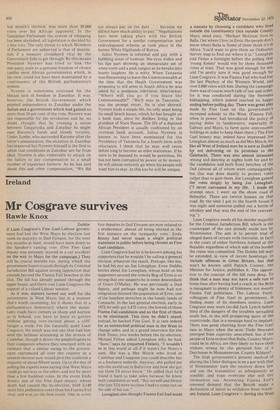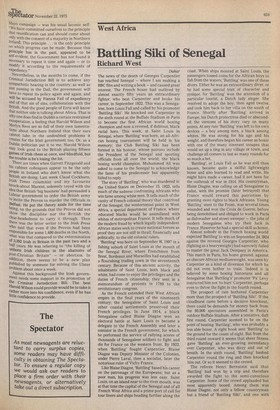Ireland
Mr Cosgrave survives
Rawle Knox
Dublin If Liam Cosgrave's Fine Gael-Labour government had lost the West Mayo by-election last week its majority in Dail Eireann, for the next few months at least, would have been down to the Speaker's casting vote. (One Fine Gael deputy was seriously injured in a car accident on the way to Mayo for the campaign.) They will be crucial months too, during which the government hopes to push through its Criminal Jurisdiction Bill against strong opposition that extends beyond the Fianna Fail benches in the Dail. The bill has already passed through the upper house, and there cost Liam Cosgrave the support of a valued Labour senator.
As it was, matters turned out well for the government in West Mayo, but in a manner that's worth examining, for it shows that in a parliamentary democracy where the mountainy roads have corners as sharp and narrow as in Ireland, you have to learn to govern without getting over-excited about a cliffhanger a week. For the naturally quiet Liam Cosgrave, the result was not one that had him send the bellman screaming in the streets of Castlebar, though it drove the psephologists to their computers whence they emerged with an estimate that a similar swing to the government reproduced all over the country in a general election now would give the coalition a majority of about fifteen seats. Up to the day of polling the experts were saying that West Mayo could go one way or the other, and not by more than a few hundred votes. In the event Enda Kenny. son of the Fine Gael deputy whose death had caused the by-election, held 3,146 more first preference votes than his Fianna Fail rival, and won on the first count. One in every four deputies in Dail Eireann are now related to a predecessor, almost all being elected in the first instance on the 'sympathy vote.' Enda Kenny had never made a single political statement in public before being chosen as Fine Gael candidate.
Liam Cosgrave had let it be known among his supporters that he wouldn't be calling a general election, whatever the result. Perhaps, like me, he had his eye on Joe Leneghan. Even Dublin knows about Joe Leneghan, whose hold on his supporters around the remote Bog of Erris is so strong that one suspects he is some descendant of Grace O'Malley. He was previously a Dail deputy, and perhaps might be now had not emigration thinned the population of Erris, one of the loneliest stretches in the lonely lands of Connacht. In the last general election, early in 1973, he only got 3,475 votes, the lowest of three Fianna Fail candidates and so the first of them to be eliminated. This time he didn't stand; instead, he backed Fine Gael. It is rare indeed for an entrenched political man in the West to change sides, and in a grand interview for the Irish Times, two weeks before the by-election, Michael Finlan asked Leneghan why he had. "Sure," says he (reported Finlan), "I wouldn't be in this world at all if it wasn't for Henry's aunt. She was a Mrs Minch who lived in Castlebar and I suppose you could describe her as a freelance midwife. Anyway, she pulled me into the world out in Ballycroy and how she got out there I'll never know." He added that he'd found it hard to take sides because he knew both candidates so well. "But myself and Henry (the late TD) were so close I had to come out on the side of his son."
Leneghan also thought Fianna Fail had made
a mistake by choosing a candidate who lived outside the constituency (not outside County Mayo, mind you). "Michael McGreal lives in Balla. Out where I live, in Erris, the people don't know where Balla is. Some of them think it's m Africa. You'd want to give them an Ordnance Survey map to find out where it is." Leneghan told Finlan a fortnight before the polling that 'young Kenny' would win by three thousand votes at least. That was good enough for me, and I'm pretty sure it was good enough for Liam Cosgrave. It was Fianna Fail who had lost the last Playboy of the Western World, and over 3,000 votes with him. During the campaign there was of course much talk of law and order, for it was conducted during the Herrema kidnapping, which indeed reached its hapPY ending before polling day. There was great play made by Fine Gael on the government's increased subsidy to the West. (Fianna Fail, when in power, had introduced the policy of paying doles to landowners, especially in Galway and Mayo, to farm quite uneconomic holdings in order to keep them there.) The Fine Gael bounty may indeed have impressed Joe Leneghan almost as much as did Mrs Minch, for like all West of Ireland men he is sore at Dublin for not delivering on its promises to the daleltacht. There was also almost incessant wining and dancing at nights both for and by the candidates and both front benches of the Dail (almost all of whom went campaigning), but this was done mainly to protect votes rather than to gain them. Joe Leneghan gained the votes simply by being Joe Leneghan. ("I never canvassed in my life. I made ar.t. attempt once. I went up the shore road in Belmullet. There are twelve houses on that road. By the time I got to the fourth house it was night and someone pulled out a bottle of whiskey and that was the end of the canvassing.") Liam Cosgrave needs all his slender majoritY for the Criminal Jurisdiction Bill, which is the counterpart of the one already made law by Westminster. The aim is to permit trial of alleged doers of certain evils (terrorist, in fact) in the court of either Northern Ireland or the Republic regardless of which side of the border the crime was committed. The Dublin bill maY be extended, in view of recent bombings, to include offences in Great Britain, but that won't be known until Patrick Cooney, the Minister for Justice, publishes it. The opposition to the concept of the bill runs deep. To think that a man may not have a safe run to home base after having had a crack at the Brits is repugnant to plenty of Irishmen, not merelY Fianna Fail . politicians. The Labour Party, colleagues of Fine Gael in government. is finding many of its members restive. Liam Cosgrave may warn (as did Jack Lynch before him) of the dangers of the troubles spreading south but, in the still prospering quiet of the countryside, that is a message hard to implant. There was great cheering from the Fine Gael men in Mayo when the stoic Tiede Herrema emerged from captivity unscathed, but if the people of Erris reckon that Balla, County Mayo, could be in Africa, are they likely to have their withers wrung by the pictured fate of 3 Dutchman in Monasterevan, County Kildare?
The Irish government's present method of playing the Ulster dialogue is on a par with that of Westminster: turn the receiver down low and use the transmitter as infrequently as possible; and hope everyone else will tire themselves out. Answering Fianna Fairs renewed demand that the British make a declaration of intent to withdraw from Northern Ireland, Liam Cosgrave — during the West Mayo campaign — was his usual laconic self: We have committed ourselves to the principle that reunification can and should come about only with the consent of a majority in Northern Ireland. This principle .. . is the only principle on which progress can be made. Because this Principle has in the past, appeared to be self-evident, the Government has not found it necessary to repeat it time and again — or to modify it according to the requirements of expediency."
Nevertheless, in the months to come, if the Criminal Jurisdiction Bill is to achieve any Sympathetic hearing in the country, as well as iust Passing in the Dail, the government will have to repeat its policy again and again, and Will be accused by Fianna Fail of expediency and of that sin of sins, collaboration with the British. And the good people of Erris will know that neither side is talking about Africa. That is Why one does find in Dublin a certain restrained exasperation, a feeling that Harold Wilson and Merlyn Rees are so full of their own lamentations about Northern Ireland that their ears cannot take in the undoubted problems it creates for the Irish government too. Or, as a Dublin politician put it to me, Harold Wilson may look good to the British playing fifteen games of Irish chess at once, and blindfold, but the trouble is he's losing the lot. There are times when Garrett Fitzgerald and his cabinet colleagues appear to be the only People in Ireland who don't know what the British are doing. Last week Claud Cockburn, Irish Times columnist and my favourite knock-about Marxist, solemnly toyed with the idea that British 'big business' had persuaded a Labour government to order the British army ko incite the Provos to murder the Officials in Belfast. He put the theory aside for the time being, on the grounds that the Provos did not Show the discipline nor the British the clearheadedness to carry it through. Then there was the letter writer to the Irish Press Who said that even if the Provos had been responsible for some 1,400 deaths in the North, What was that compared to the extermination of 3,392 Irish in Britain in the past two and a half years. He was referring to "the killing of unborn Irish children in the abattoirs of Post-Christian Britain" — or abortion. In addition, there seems to' be a new plan Published by someone for solving the Ulster Problem about once a week.
Against this background the Irish government needs some support in its promotion of the Criminal Jurisdiction Bill. The best Harold Wilson could provide would be to take it rather more into his confidence, even if he has little confidence to provide.

































 Previous page
Previous page